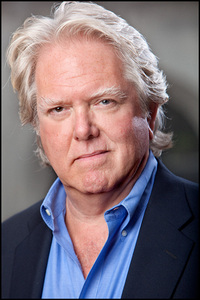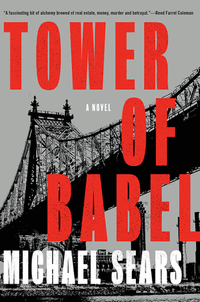Earlier today, I posted my overdue take on Michael Sears’ novel Tower of Babel, and now I have the chance to share this Q&A that Sears was gracious enough to participate in. Thanks to Wiley Saichek for facilitating this.
I’d sent these questions during Release Week for Tower of Babel, so I appreciate his edit to question 6 so it still works. I love these answers, hope you enjoy them, too.
According to his website, “Until 2005, Mr. Sears was a Managing Director for two different Wall Street firms, where he  worked in the bond market for twenty years and, earlier, in foreign exchange and derivatives. Prior to returning to Columbia University for his MBA, he was, for eight years, a professional actor appearing at the Shakespeare Theatre of Washington (Folger Theatre), Playwright’s Theater of Washington, New Jersey Shakespeare Festival, The Comedy Stage Co., and, in the course of a single year, every soap opera shot in New York City.
worked in the bond market for twenty years and, earlier, in foreign exchange and derivatives. Prior to returning to Columbia University for his MBA, he was, for eight years, a professional actor appearing at the Shakespeare Theatre of Washington (Folger Theatre), Playwright’s Theater of Washington, New Jersey Shakespeare Festival, The Comedy Stage Co., and, in the course of a single year, every soap opera shot in New York City.
He is married to the artist and poet, Barbara Segal. Together with the not-altogether-domesticated cat, Penelope, they live in Sea Cliff, NY, within sight of the towers of New York.”
Could you take a moment or two to introduce yourself to my readers? What set you on the path to writing, describe your path to publication, genre choices, and so on?
My name is Michael Sears. I’ve been fortunate in my life that my hard work paid off. I now get to write books and have them published. This is the best of all possible worlds.
When I left Wall Street, I gave myself the gift of a creative writing course – which lead to another, and another, dreaming all the while that I might get a short story published someday. I had two books out before my dream came true.
I have been a reader – a fan – of crime writing from an early age. Freddy the Detective (Walter Brooks) was an early favorite. My mother encouraged my reading and I was soon devouring Sherlock Holmes, Rex Stout, Dashiell Hammett, Agatha Christie, and so on.
Assuming you can answer this without spoiling anything—why walk away (however temporarily it may be) from your Jason Stafford series to launch a new one? What was it about Ted Molloy that made you want to tell his story? Or did you have the story and have to build Ted to fit it?
I began the Jason Stafford series with the idea of following the arc of this man’s journey as his autistic son leads him to a greater appreciation for life beyond making money. Jason made the trek. And I discovered that I had written him into a corner. It was no longer okay for him to put his life at risk. More people depended on him. He’d found love and duty and a responsibility to both. He may come back some day – certainly the Kid’s arc is nowhere near done – but I’m busy right now with another man in need of some humanizing.
A question I had running through my mind a lot while reading is that this feels like a very New York kind of story. Do you think about how to make something like this work for audiences in, say the Pacific Northwest or the Plains States, where it’s hard to relate to so much of the story and real estate concerns? Is it actually possible to make a living like Ted does doing this kind of thing?
Real Estate is the religion of New Yorkers. It binds everyone with a common language, and set of experiences, yearnings, disappointments, and successes. There is a shared sense of what each individual needs to feel fulfilled. I don’t know that this feeling is easily transported to another city. I was born in Manhattan and lived there for many years and this sense is in my blood.
And, yes, it is possible to eke out a living along the periphery of New York’s real estate industry. The big sharks leave plenty of crumbs behind. A diligent worker will make a buck or two; a lucky one can earn a good bit more.
There were great secondary and tertiary characters throughout this book. Do you spend a lot of time and energy on them before introducing them to the story, or do they just pop up and you run with them? Specifically, let’s focus (almost at random) on The Preacher and Mohammed—there’s some comic relief to them, but more, too. Are they as fun to write as it seems?
Secondary characters support the main characters. They can provide a sounding board, some humor, and opportunities to explore the depth of the main characters. Lester is a great example. Tertiary characters provide specific functions like muscle or messenger but a writer has the latitude to play a bit. These folks can be ciphers or flamboyant and memorable figures. When in doubt, I go for the latter. And yes, they are fun to write. While I want readers to enjoy Ted’s explorations of right and wrong, I know they’ll get a kick out of Mohammed. As they serve the plot, rather than carry it, I feel free to let them lead me. And that’s fun. Sometimes surprising. I liked Mohammed so much, I made his story the main plot line of the sequel. (Tentatively titled, LOVE THE STRANGER, I expect this book to be out sometime in 2024.)
I was going to read the sequel already, but if Mohammed is the focus? I’ll rearrange my schedule.
The relationship between Jill and Ted worked on so many levels—I could probably do a Q&A focused solely on it. The way it adds layers to Ted and humanizes him is fantastic, it’s also not at all what I expected to find in this kind of book. Can you talk a little bit about why their relationship (particularly focusing on its status early on) was important to the novel outside of the later plot complications? I realize it’s dangerous to equate a fictional character’s politics/religion/tastes with the author, but especially in the contest of these two, I have to assume you share their sentiments when it comes to the Mets?
I am a lifelong Yankees fan. But the Mets offer a writer much more nuance and that plays to Ted’s history and his future.
Jill is such a great foil for Ted, revealing much about his character. Jill, like Ted, doesn’t know exactly who she is because she has tried so hard to be someone else. She begins her journey of discovery first, but Ted surpasses her. We’ll have to see where they each end up as the series progresses.
My process is more exploratory than structured. I am a pantser. at least for the first half of the book – or more. At some point I have to come up with an outline, just so I can put the plot in some kind of order. But I get to try out characters and see where they take me without a lot of pre-thought or judgment. Jill was a happy discovery. And she kept demanding to stay in the limelight.
Tower of Babel has been released for a while. Do you have anxiety when a new book is released? How did it compare to the previous novels?
I’m the guy who refuses to acknowledge my own anxiety – a trait that drives my wife nuts. I try to stay busy as pub day approaches. I don’t get much done, but the distractions give me the illusion of progress.
Tower of Babel won the 2022 Nero Award, as someone who’s been re-reading that series for decades, I have to ask—outside of that award, do you have much of a connection to Nero Wolfe as a fan/reader? What about the series grabs you? Can you see an influence of Stout on your writing (whether or not anyone else can)?
I read Rex Stout before Agatha Christie. My mother suggested I try him after I read all the Sherlock Holmes. I’m guessing I was in 6th or 7th grade at the time. Maybe that was too young because it was a long time before I came back to them.
I like that Wolfe solves crimes with his brain. Archie provides evidence – and often gets the significance all wrong – and Nero Wolfe puts it all in proper order. But it’s the trappings of the stories that keep bringing me back. I most enjoy when Wolfe is dragged out of his home – it’s rare, I know. Too Many Crooks is one of my favs. It takes place at The Greenbrier and I was once at a conference there.
There’s a game we play around here, called “Online Bookstore Algorithm”. What are 3-5 books whose readers may like Tower of Babel?
That is the most positive way I have been asked this question. I usually duck it because I try hard to be unique. But your method has swayed me. Charmed me.
A reviewer once said of a book of mine that it read like a combination of Ian Fleming and Woody Allen. If they’d also said I looked like George Clooney, I couldn’t have been happier.
Donna Leon’s Venice series comes to mind. The human interactions are as important as the plot. And the ends are always sad. Evil escapes unscathed all too often.
Another series, which we all know from PBS, is Morse. The books are quite good too. And here again, the innocent often are served worse than the guilty.
WHAT YOU BREAK, by my good friend, Reed Farrell Coleman for sense of place and the noir mood.
I think of TOWER OF BABEL as a love story. SOMETHING TO HIDE by Elizabeth George comes to mind.
Again, the issue of place is important. And so THE DEAD OF WINTER by my fellow Soho author – and Nero Award winner – Stephen Mack Jones.
I didn’t think of What You Break, but that’s absolutely the same kind of feel! I’m tempted to go re-write my post about Tower of Babel now discussing the relationship between the two.
What’s next for Michael Sears, author?
A sequel to TOWER OF BABEL is making its torturous way through the publication process, which means I have turned in a complete book to my Soho editor and now await a round or two of edits before we set a pub date – which will most likely be next spring.
And as I am writing all the time, there may be more. Stay tuned.
Thanks for your time—and thanks for Tower of Babel. I really enjoyed it, and hope you have plenty of success with it.





